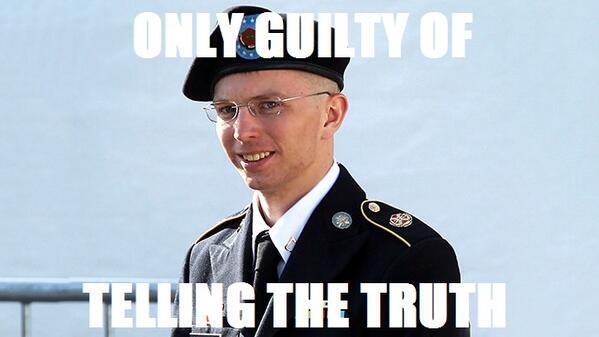Bradley Manning: Verdict for Alleged WikiLeaks Source to Come Today
Army Pfc. Bradley Manning, right, is escorted into a courthouse at Fort Mead, Md., for the fourth day of his court martial, June 10, 2013.
A military judge will announce today the verdict in the case of Private Bradley Manning, the young man who could face life in prison for allegedly stealing over 700,000 classified military battlefield reports and diplomatic cables and giving them to the anti-secrecy website WikiLeaks.
The release of the documents has been described as the most extensive leak of classified information in U.S. history.
Manning has been charged with 22 counts, the most serious of which is that of aiding the enemy, which carries the prospect of a life sentence. In February, he pleaded guilty to 10 of the lesser charges that together carried a 20-year prison sentence.
LIVE UPDATES: Bradley Manning Verdict
The court martial began three years after Manning, now 25, was first detained in Iraq for suspicion of having leaked the video of a 2007 Apache helicopter attack that killed several Iraqi civilians. He was subsequently charged in relation to the November 2010 leak of the nearly three-quarter million classified or confidential documents.
READ: WikiLeaks Releases Confidential Diplomatic Cables
Julian Assange, the founder of WikiLeaks, has said that Manning was a "hero" for doing what he did. Prosecutors called him an anarchist and traitor.
As part of his earlier partial guilty plea, Manning read a 35-page statement in which he explained his motivations in releasing the classified documents. Manning said he had wanted "to spark a debate about foreign policy" and show "the true cost of war."
Manning did not testify during the nearly two-month court martial.
Army prosecutors argued that Manning showed "general evil intent" in aiding the enemy. They argued that given his intelligence training he knew that leaking classified information to the Internet would end up in the hands of al Qaeda.
Prosecutors provided evidence that some of the military battlefield reports had been found on a computer belonging to Osama bin Laden that had been seized during the U.S. military raid that killed the al Qaeda leader in May 2011.
READ: WikiLeaks Suspect Bradley Manning Chokes Up at Hearing
Prosecutors presented detailed computer forensics of Manning's computer activity during his deployment to Iraq in late 2009 to mid-2010. They said the evidence showed that within weeks of his arrival in Baghdad, Manning had begun searching classified military computer networks for materials that were of interest to WikiLeaks.
Manning's attorneys said Manning did not begin leaking information until February 2010. They described Manning's doubts about his military service following a Christmas Eve incident where an Iraqi family was injured by a roadside blast that had targeted soldiers from his unit.
"He couldn't forget the lives lost that day," said defense attorney David Coombs during opening arguments. He portrayed Manning as a young, naive soldier who decided to release the classified documents he had access to "because he thought he could make the world a better place."
In their closing arguments prosecutors dismissed those claims. "He was not a humanist, he was a hacker," said Maj. Ashden Fein.
Fein said the only naivete Manning displayed during the time he was sending classified documents to WikiLeaks was that "he actually thought he would get away with what he did and wouldn't get caught."
Fein was equally dismissive of the support Manning has received from civil liberties and anti-secrecy advocates who consider him a whistleblower.
"He was not a whistleblower, he was a traitor," said Fein as he concluded his lengthy closing arguments last Thursday.
Now being held at the military prison at Fort Leavenworth, Kan., Manning's initial detention at the Marine brig at Quantico, Va., became the subject of controversy after jailers deemed him a suicide risk.
Manning was forced to remain in solitary confinement for up to 23 hours a day and on a few occasions he was required to remain naked. His attorneys said the treatment merited dismissing the case against him because it amounted to cruel and unlawful punishment.
After a lengthy pre-trial hearing late last year, judge Col. Denise Lind found there was validity to some of the allegations and reduced any potential prison sentence by 112 days. Lind is the one who will decide Manning's fate today.

====
Update: #Manning not guilty of aiding the enemy, faces 100+ yrs in jail on other charges
~via @RT_America #ReleaseBrad
http://rt.com/usa/manning-not-guilty-aiding-enemy-805/
++++++++++++++++++++++++++++++++++++++++
HELP-Matrix Humane-Liberation-Party Blog ~ http://help-matrix.blogspot.com/ ~
Humane-Liberation-Party Portal ~ http://help-matrix.ning.com/ ~
@Peta_de_Aztlan Blog ~ http://peta-de-aztlan.blogspot.com/ ~ @Peta_de_Aztlan
+++++++++++++++++++++++++++++++++++++++++
No comments:
Post a Comment
Please keep comments humane!